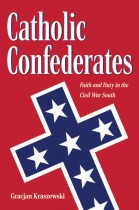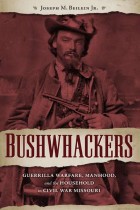The Civil War Era in the South is no longer taking submissions.
Please consider submitting to one of our our current series,
Interpreting the Civil War: Texts and Contexts or
Civil War Soldiers and Strategies
The Civil War Era in the South will offer readers the latest in cutting-edge scholarship as it pertains to the southern experience during the American Civil War era. While the series will focus exclusively on the South in its totality (upper, lower and border South), books published will offer a wide range of historical topics, including politics, military campaigns, the experience of the common soldier, the hardships on the home front, and the dynamics of race, gender, and class within southern society. The series will address the latest trends in Civil War historiography, including medicine, environmental history, cultural studies, guerrilla conflict, and the dynamics of memory in the aftermath of the Civil War. Political, social, and cultural explorations of Reconstruction in the South are also welcome. At the same time, Civil War in the South will offer edited collections of diaries and letters from soldiers, politicians, and civilians who endured the most traumatic chapter in American history. The series will also include biographies of prominent military, political, and civilian figures and reprints of classic works that have significantly shaped how we think about the South during the Civil War era.
Gracjan Kraszewski
|
Filed under: Civil War Era, The Civil War Era in the South, U.S. History

For the majority of Southern Catholics, religion and politics were not a point of tension. Devout Catholics were also devoted Confederates, including nuns who served as nurses; their deep involvement in the Confederate cause as medics confirms the all-encompassing nature of Catholic involvement in the Confederacy, a fact greatly underplayed by scholars of Civil War religion and American Catholicism. Kraszewski argues against an “Americanization” of Catholics in the South and instead coins the term “Confederatization” to describe the process by which Catholics made themselves virtually indistinguishable from their Protestant neighbors.
Joseph Beilein Jr.
|
Filed under: Audiobooks, Civil War Era, Military History, The Civil War Era in the South, Understanding Civil War History

New in Paperback!
Bushwhackers adds to the growing body of literature that examines the various irregular conflicts that took place during the American Civil War. Author Joseph M. Beilein Jr. looks at the ways in which several different bands of guerrillas across Missouri conducted their war in concert with their households and their female kin who provided logistical support in many forms. Whether noted fighters like Frank James, William Clarke Quantrill, and “Bloody Bill” Anderson, or less well-known figures such as Clifton Holtzclaw and Jim Jackson, Beilein provides a close examination of how these warriors imagined themselves as fighters, offering a brand-new interpretation that gets us closer to seeing how the men and women who participated in the war in Missouri must have understood it.
This is a civilwar north archive



